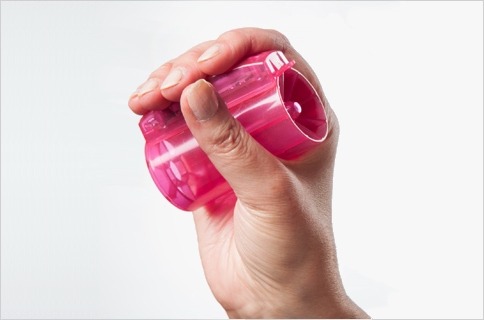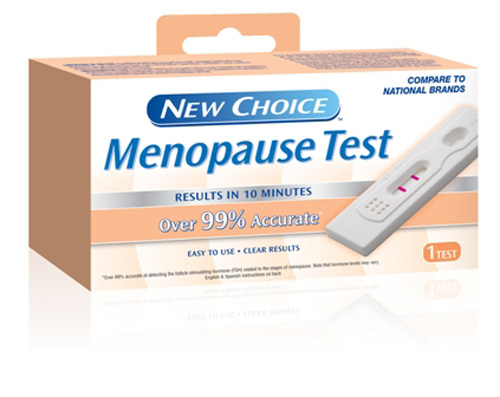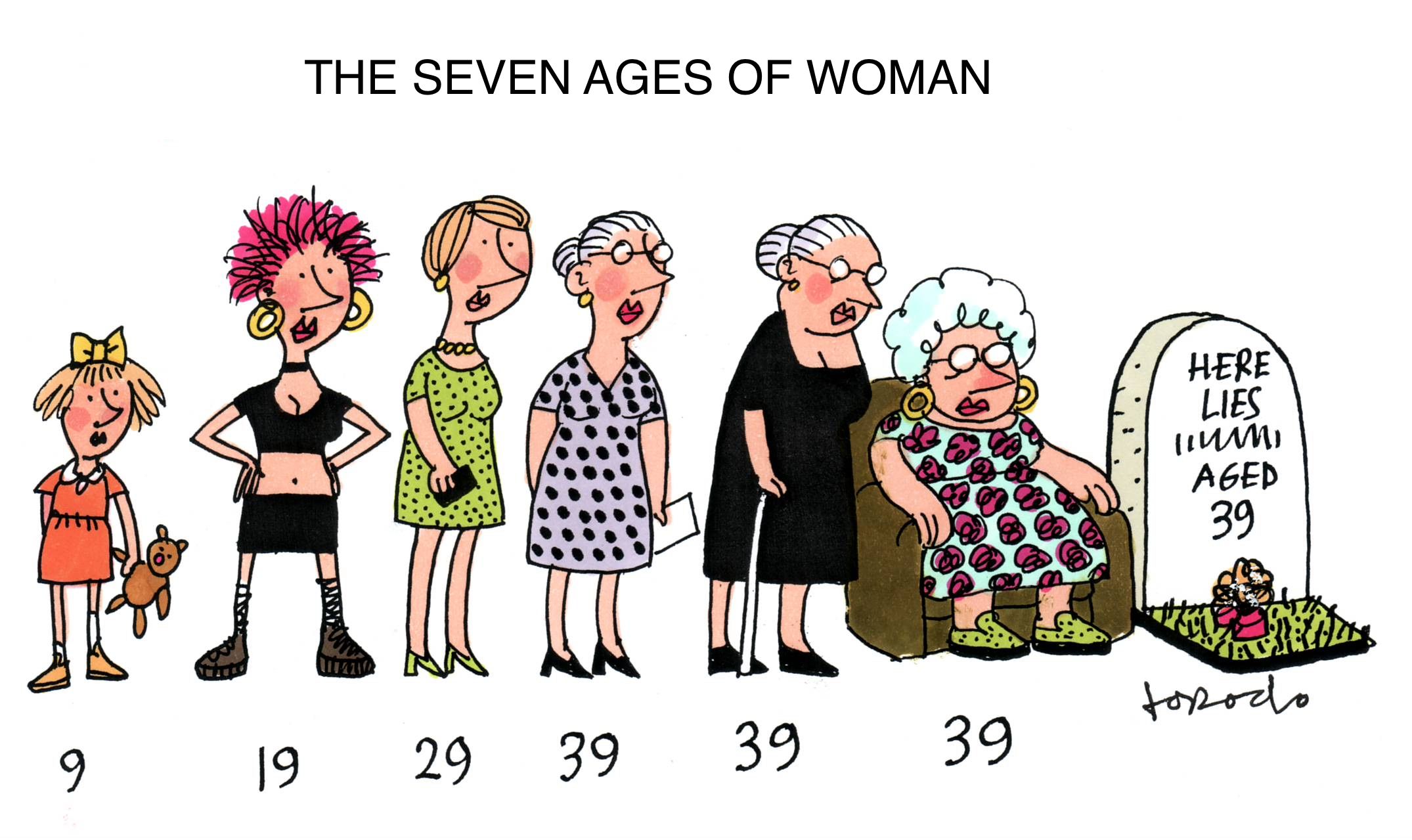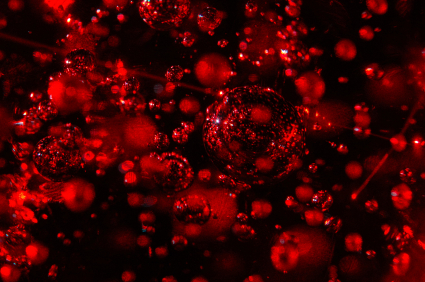Wednesday Bubble: Test me this
In case those hot flashes, night sweats, drastic mood swings, aches, pains and forgetfulness have you confused, the manufacturers of First Response pregnancy test are here to help.
Wait, what? Pregnancy?
No, not pregnancy. Menopause!!!
That’s right, ladies, to be certain that your FSH levels are [cue music] menopausal, the New Choice™ Menopause Test is here!!! This nifty “99%” accurate test will allow you to start monitoring your hormone levels as soon as those perimenopausal symptoms start to hit. But here’s the rub. While a prolonged increase in FSH levels can indicate a diminished ovarian reserve and therefore, the beginning of the menopausal transition, hormone levels do and can fluctuate. Moreover, in some women, FSH can return to normal and then perhaps increase over a number of months. What this means is that FSH measurements are hardly foolproof OR proof that menopause is starting.
Because hormone levels tend to fluctuate, most practitioners will recommend monthly tests, or should I say, monthly BLOOD tests. Urine test findings may correlate with blood testing but if blood testing is the norm and are hardly accurate, one has to question the accuracy of urine tests. If it looks like a rat and smells like a rat, well…
Menopause home testing will cost you about $6.50 a month or $78 a year. If I were you, I’d save your money and schedule a visit to your health practitioner. That visit, along with a year of no menstrual periods, brings the accuracy levels a lot closer to 100%.
Read More
Wednesday Bubble: Thar she blows
 As my Cold Front friend Susie Hadas knows, I take no prisoners on this blog, especially on Wednesdays. So, when ‘BlowMeCool’ approached me via the Twitter back channels to review their mini-fan, I warned the administrator in advance that things might not be so pretty.
As my Cold Front friend Susie Hadas knows, I take no prisoners on this blog, especially on Wednesdays. So, when ‘BlowMeCool’ approached me via the Twitter back channels to review their mini-fan, I warned the administrator in advance that things might not be so pretty.
Let’s just start with the name.
Blow Me. Yes, there is another word there but I find that I can’t quite get to the ‘cool’ part. I keep getting stuck on blow me. And I am not sure if that speaks more to my foibles than to theirs’.
In an accompanying press release, BlowMeCool is described as ‘a mini-fan [with] not exposed propellers or blades. Its unique design allows it to operate while hidden in the hand, delivering a stream of air that women who experience hot flashes will love.’ “It’s so quiet nobody even knows when I’m blowing myself cool – having a friendly little fan during my hot flashes – is pretty cool,” a user is quoted as saying.
Yet, here’s the rub. Unless you have hands the size of a man, this little nifty device is not quite discreet enough nor is it quiet enough, say, for pulling out in the middle of a meeting with new clients. But I digress.
When I opened the package, I was struck by the fact that BlowMeCool appears to have little hot flashes of its own as its battery runs out of juice. Irony much?! However, I applaud that manufacturer for the chargeability factor; you simply plug this nifty little device into your computer and bam! You are charging its lithium battery. Wait! What if you don’t have a computer? Huh!
I truly believe that the company is on to something special here. But I’m waiting on the next generation — something even smaller, quieter and a model that offers the user charging flexibility. Two hours of cool ain’t bad but if you out and about and nowhere near a charging station, it might not be enough for the woman with hourly flashes. And the plug for the husband complaining about night sweats? This little itty fan is not going to dry the sheets when the sweats hit. And the name? Please please please think about a new name. The name is a recipe for disaster.
Does BlowMeCool ‘blow?’
Yes and no. You decide.
[Disclosure: BlowMeCool provided me with a device to review but did not provide any compensation for this post. Nor did I request any. The opinions are strictly mine.]
Read More
Newsflash! SSRIs & Hot Flash Rebound
 You may recall the researchers have been studying the ability of the antidepressant Lexapro to reduce the frequency and severity 0f hot flashes.
You may recall the researchers have been studying the ability of the antidepressant Lexapro to reduce the frequency and severity 0f hot flashes.
The results have been impressive, with onset of action within a month of initiating therapy. Missing, however, has been information about how long a woman needs to say on Lexapro to gain benefit. And what happens when she stops taking the drug. In one trial, women who stopped using Lexapro after 8 weeks experienced a resurgence of flashes. This is not much different than the reaction seen when HRT is stopped; both types of drug regimens only appear to work so long as a woman continues to use them.
Researchers are now reporting that when they examined the diaries of the same group of women referenced above (whose frequency, severity and bothersome factor of vasomotor symptoms improved after 8 weeks of Lexapro treatment) they found that a significant relapse occurred three weeks after stopping treatment. In fact, by the end of three week period, roughly a third (34%) of the women who had experienced a reduced frequency of their hot flashes, and roughly 39% who had experienced less severe flashes relapsed. In both of these groups of women, respectively, relapse was defined as a 15% increase in more frequent hot flashes and a roughy 11% increase in hot flash severity over the symptoms that they had when they first started the study. Overall, the women lost at least 50% of the original benefit they had gained.
The most important factor appears to be higher degree of insomnia symptoms before taking Lexapro and a weaker overall response to it while on it. In fact, every one point difference in the insomnia severity scale was associated with an 11% greater odds of a relapse; women who responded less well to Lexapro by week 8 had a threefold greater chance of relapse after stopping the agent for three weeks.
The choice is clear. It is much easier to start both hormonal and non-hormonal treatments than it is to stop them. And when you stop, you increase the odds that you will be experiencing worsened symptoms. When you do the math, it doesn’t look so good. Big gain, bigger loss.
Read MoreWho’s your advocate?
Do you have an advocate? Someone who understands you, knows you well enough to read between the lines, trusts you and actually likes you?
If you do, luck is your lady. And if you have an advocate in your professional life? Boy, that’s the lottery, the gold ring, Nirvana.
So let’s talk about that, shall we?
I’ve written previously about becoming invisible in the work world as we age. I have written about friendships and the health benefits that can be gleaned. And I have written about how the transition can change our outlook on work and life. But what happens when all of these things converge? Is it the perfect storm? Or just perfect?
I want to share a story. When I was in my Twenties, just starting out in my career, I worked for a NYC PR agency. After the head of our department sadly passed away from AIDS, he was replaced by someone from our parent company who was very competent but very insecure. I was already a fixture so she had to deal with me and reluctantly she did. And then she brought in a woman who I was supposed to hate. Seriously, those were her words. And that person? She was told she would hate me.
Guess what? Not only did we not realize pretty quickly that we did not hate one another but it turned out to be one of the most productive and functioning professional relationships I have ever experienced. More importantly, I gained a friend.
And, after many decades, while the friendship has remained, fate has brought our professional relationship back into being. Who would have thunk it when both of us were in our twenties and living in NYC and two women who were theoretically not destined to get along?
I’m tough to work with at times. No, I am downright difficult and impatient. But I have a birdseye view of things and can see waaaay into the future of a project, which is an important asset. And her? She’s really smart and patient and has really good instincts. And is really strategic, like me. Together, we make a pretty fine couple. And a fantabulous team and probably should have always been merged into one. A professional one.
What a concept!
So, I digress. Because I want to share that advocates are SO important as we grow into our professional roles. I have been fortunate to have several in my life. Really fortunate. But more importantly, when you find that special advocate (or advocates), don’t let them go. Let them know how much you appreciate them. And nurture them as they nurture you.
Hey Melon. You are da bomb. No really!
Thank you. I love you through and through.
We ain’t 26 or 27 anymore sister, but we still are. Wow! How lucky am I?
Read More
Wednesday Bubble: It’s getting hot in here…
Hot flashes.
Does anyone really know what occurs in the body to cause the sudden surge of temperature, the licking of the of the internal flame and the momentary feeling that those droplets of sweat dripping down your face are doing NOTHING to alleviate the heat that is emanating from every pore of your body?
Evidently, researchers are coming closer to discovering the ‘why’ behind the flash. And the reason that this is so important is that when medical experts discover the why, they are then one step closer to figuring out how to fix it.
So, let me tell you what’s what.
As I wrote just last week, experts believe that hot flashes are related to a dysfunction in a process called ‘thermoregulation;’ this is the ability to keep our body temperature in a steady state, even when the environment changes. A decrease in estrogen levels, coupled with increased activation of the sympathetic nervous system (which assists in controlling the body’s functions and the fight or flight mechanism) narrows the natural comfort zone and tolerance for temperature fluctuations. Voila! A flash is born.
Hold on. In a new paper published in the open access Proceedings of the National Academy of Sciences, Dr. Naomi Rance from the University of Arizona College of Medicine explains that while the surface of the skin may feel hot during a hot flash, if one was to measure the internal core temperature, it is not even elevated. Rather, she and her team have identified a role that a group brain cells know as KNDy (kisspepti/neurokinin B/dynorphin) may play. These cells are located in an area of the brain — the hypothalamus — that controls metabolic processes related to the autonomic nervous system, including body temperature.
Dr. Nance and her team have only studied the KNDy neurons in rats so far, but what they’ve found is interesting: when they created a model to mimic menopause by withdrawing estrogen, they found that the KNDy cells response is extreme – they grow extremely large and manufacture greater amounts of neurotransmitters that communicate to the part of the brain that regulates body temperature. More communication equals more signalling that the body too hot and needs to release heat. The result? A hot flash and lots of vasodilation and sweating. But here’s the rub: when they measured the temperature of the tail skin in rats with normal KNDy neurons versus those who neurons were shut off, they found that their skin temperature was lower, even with the depletion of estrogen.
While these findings are not yet specific to women, they do show that the KNDy neurons appear to play an important role in regulating skin temperature and its reaction to signals that ‘it’s getting hot in here.’ Perhaps the silver lining is that if they can take it one step further and figure out how to positively control the KNDy cells in humans, they may be able to influence thermoregulation and literally stop those flashes before they start without affecting our real core body temperature.
Stay tuned!
Read More










